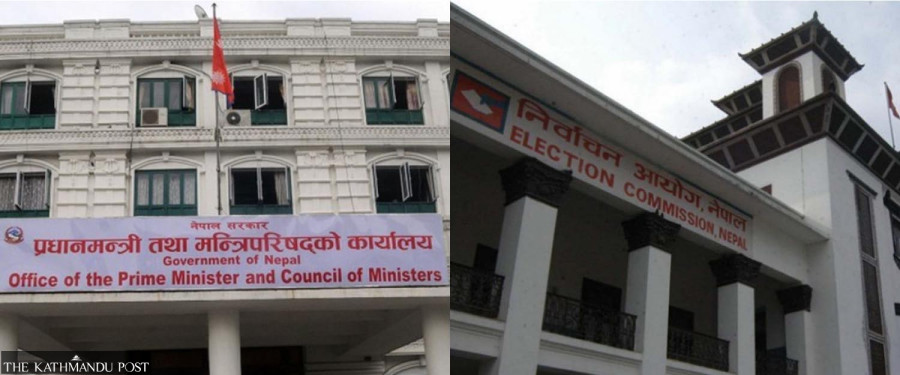National
Cabinet decision to waive fines of local poll candidates draws flak
Government had decided to exempt fines imposed by poll commission on candidates who failed to furnish campaign spending details on time. The decision has been challenged in court.
Tika R Pradhan
A writ petition has been registered at the Supreme Court challenging the President’s decision to waive the fines of the candidates of the local polls held last year failing to submit it to the Election Commission.
Bimal Poudel, the spokesperson for the Supreme Court, confirmed that the petition was registered on Wednesday. The first hearing in the petition filed by Advocate Lokendra Oli will be held on Friday.
President Bidya Devi Bhandari on Friday, as per the government’s recommendation, waived the fines of all candidates of the latest local elections who had failed to submit their expenditure reports on time. Though there were concerns that the fine was too high and impractical, experts say such moves of undermining the constitutional body’s decisions will weaken democracy.
The Election Commission imposed fines of up to Rs750,000 on those who failed to submit the mandatory expenditure reports within a month after the election results were out.
The commission took punitive action after a large number of candidates ignored the election body’s repeated warnings.
“The government should have reduced the fine amount if that was impractical, but it was not good to waive the fines. It will not send a good message across,” said one of the election commissioners. “These sorts of activities will disregard and weaken the autonomous constitutional body.”
There were concerns from a large number of candidates of the local-level election held on May 13 last year that the fine amount was way too high and they couldn’t pay it.
The commission had slapped a total of Rs24.63 billion fine for those failing to submit details of the expenses made during the local-level elections in accordance with the election law. All the candidates must furnish details of poll expenditures within 30 days of the final election results, as per the Election Commission Act.
Section 25 of the Act makes it mandatory for the political parties or the candidates contesting the polls to submit details of their election expenses to the office designated by the poll commission. The commission has designated district election offices or regional ones to receive the details of the expenses.
The President’s move, however, was constitutional. Article 276 of the Constitution of Nepal, 2015 states that the President may, in accordance with the law, grant pardon, suspend, commute or remit any sentence passed by any court, judicial or quasi-judicial institution or administrative authority or institution upon a recommendation by the Cabinet.
The Office of the President said the decision was made as per the recommendation by the Cabinet meeting.
The government on Thursday decided to recommend the President grant a waiver of the fine amount slapped by the commission on 123,650 candidates. However, the government’s decision is silent on the status of the candidates who have already paid the fine.
The government move followed the Supreme Court’s interim order against implementing the decision of the Election Commission to charge fines on 123,650 candidates in the local polls for not submitting their expenditure details on time.
Last Wednesday, the Supreme Court issued the order after hearing on a writ petition filed by Kathmandu Mayor Balendra Shah against the commission. The court is yet to give its final verdict on the matter.
The commission had decided that the fine amount should be paid within six months (by mid-March). It also announced a restriction on the participation of candidates failing to submit expense details on time for six years if they failed to pay the fine.
Experts have expressed serious concern over the waiver saying that the government led by a politician who talks about zero tolerance against corruption has promoted impunity for a particular section of society.
A large number of candidates including Prime Minister Pushpa Kamal Dahal’s daughter Renu, who was re-elected the mayor of Bharatpur Metropolitan City, were fined for not submitting their election expenses on time. The election body had decided to impose a fine of Rs750,000 on the mayoral candidates of the metropolitan city.
“Actually the fines were imposed to make the candidates accountable for their election expenses,” said lawyer Bhimarjun Acharya. “But the recent decision is like giving a clean chit to a corrupt person. Now there is no point for the government to speak about good governance.”
Acharya said the government decision is “unacceptable and objectionable on all accounts–legally and politically”.
Chief Election Commissioner Dinesh Kumar Thapaliya said he has drawn some messages from the President’s waiver of fines—the government has proved that the commission’s decision was right, giving it legal validity.
Thapaliya said laws related to imposing fines could be impractical and may need some correction if the fine was too high. The presidential waiver has not stopped the people’s representatives from abiding by the law, it only has given room for reviewing existing laws.
Former chief election commissioner Neel Kantha Upreti said the decision to pardon the fines is of serious concern because this could weaken the constitutional body.
“It’s like overruling the decision of a referee in a game by an authority outside,” Upreti told the Post. “If an institution like the Election Commission weakens, you cannot expect free and fair elections and that could ultimately hit the democratic process.”




 18.12°C Kathmandu
18.12°C Kathmandu














